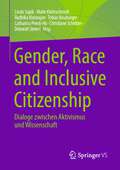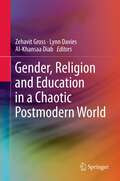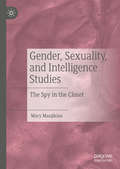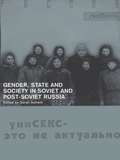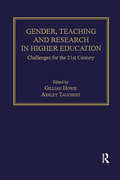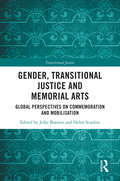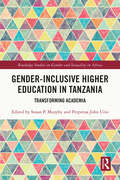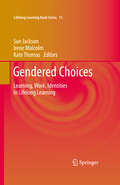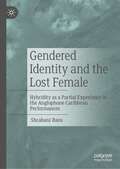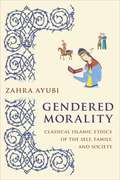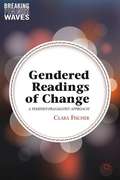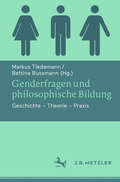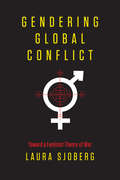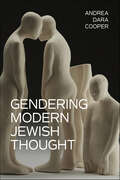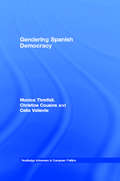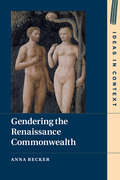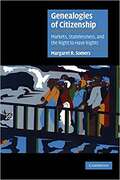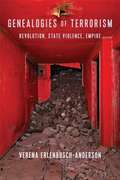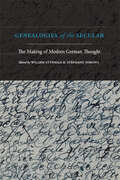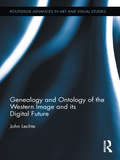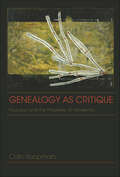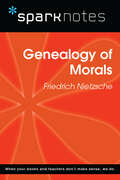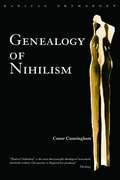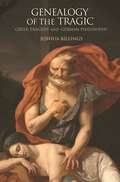- Table View
- List View
Gender, Race and Inclusive Citizenship: Dialoge zwischen Aktivismus und Wissenschaft
by Linda Supik Malte Kleinschmidt Radhika Natarajan Catharina Peeck-Ho Tobias Neuburger Christiane Schröder Deborah SielertDer zweisprachige Band untersucht Kämpfe und Regimes der Zugehörigkeit und diskutiert „Inclusive Citizenship“ in Originalbeiträgen und Konversationen von internationalen Forscher*innen und Aktivist*innen. Im Spannungsfeld von Acts und Regimes of Citizenship stellen sich hochpolitische Fragen der Agency zu Bewegungsfreiheit, digitalen Rechten, Zugehörigkeit zum städtischen Raum, Care und Sprache. Wir diskutieren diese im lokalen, regionalen, digitalen oder (trans-)nationalen Raum zu aktuellen Migrationsbewegungen nach und in Europa, rassismuskritischem und (queer-)feministischem Aktivismus gegen institutionelle und Alltagsdiskriminierung in ungleichen Gesellschaften.The bilingual volume examines struggles and regimes of belonging and discusses "inclusive citizenship" in original contributions and conversations by international researchers and activists. Between acts and regimes of citizenship, highly political questions of agency emerge about freedom of movement, digital rights, belonging to urban space, care, and language. We discuss these in local, regional, digital or (trans-)national space regarding current migration movements to and in Europe, and critical racism and (queer-)feminist activism against institutional and everyday discrimination in unequal societies.
Gender, Religion and Education in a Chaotic Postmodern World
by Lynn Davies Al-Khansaa Diab Zehavit GrossThe immense changes that the world is undergoing in terms of globalization and migration of peoples have had a profound effect on cultures and identities. The question is whether this means shifts in religious identities for women and men in different contexts, whether such shifts are seen as beneficial, negative or insufficient, or whether social change actually means new conservatisms or even fundamentalisms. Surrounding these questions is the role of education is in any change or new contradiction. This unique book enhances an interdisciplinary discourse about the complex intersections between gender, religion and education in the contemporary world. Literature in the social sciences and humanities have expanded our understanding of women's involvement in almost every aspect of life, yet the combined religious/educational aspect is still an under-studied and often under-theorized field of research. How people experience their religious identity in a new context or country is also a theme now needing more complex attention. Questions of the body, visibility and invisibility are receiving new treatments. This book fills these gaps. The book provides a strong comparative perspective, with 15 countries or contexts represented. The context of education and learning covers schools, higher education, non-formal education, religious institutions, adult literacy, curriculum and textbooks. Overall, the book reveals a great complexity and often contradiction in modern negotiations of religion and secularism by girls and boys, women and men, and a range of possibilities for change. It provides a theoretical and practical resource for researchers, religious and educational institutions, policy makers and teachers.
Gender, Sexuality, and Intelligence Studies: The Spy in the Closet
by Mary ManjikianThis is the first work to engage with intelligence studies through the lens of queer theory. Adding to the literature in critical intelligence studies and critical international relations theory, this work considers the ways in which both the spy, and the activities of espionage can be viewed as queer. Part One argues that the spy plays a role which represents a third path between the hard power of the military and the soft power of diplomacy. Part Two shows how the intelligence community plays a key role in enabling leaders of democracies to conduct covert activities running counter to that mission and ideology, in this way allowing a leader to have two foreign policies—an overt, public policy and a second, closeted, queer foreign policy.
Gender, State and Society in Soviet and Post-Soviet Russia
by Sarah AshwinOne of the few English language studies to focus on the male experiences, this book addresses the important questions raised by the rise and fall of the Soviet experiment in transforming gender relations. Issues covered include; * the paternal role * women as breadwinners * men's loss of status at work * changing gender roles in the press * the relationship between the sexual and gender revoloutions. Featuring an outstanding panel of Russian contributors, this collection is a valuable resource for students and scholars of Politics, Gender Studies and Russian Studies.
Gender, Teaching and Research in Higher Education: Challenges for the 21st Century
by Gillian Howie Ashley TauchertGender, Teaching and Research in Higher Education presents new insights and research into contemporary problems, practical solutions, and the complex roles of teaching and learning in the international academy. Drawing together new research from contributors spanning a range of international and interdisciplinary perspectives, this book discusses topics of particular importance in the UK, USA, Australasia and South Africa, including: curriculum, boundary disciplines and research assessments, the Higher Education institution, educational practice, authority and authorization, teaching and counselling. Discussion of quality audits, curriculum modifications, teaching certificates and other key topics, add to this book's value in informing current debate and providing valuable research aids for education into the 21st Century.
Gender, Transitional Justice and Memorial Arts: Global Perspectives on Commemoration and Mobilization
by Jelke Boesten and Helen ScanlonThis book examines the role of post-conflict memorial arts in bringing about gender justice in transitional societies. Art and post-violence memorialisation are currently widely debated. Scholars of human rights and of commemorative arts discuss the aesthetics and politics not only of sites of commemoration, but of literature, poetry, visual arts and increasingly, film and comics. Art, memory and activism are also increasingly intertwined. But within the literature around post-conflict transitional justice and critical human rights studies, there is little questioning about what memorial arts do for gender justice, how women and men are included and represented, and how this intertwines with other questions of identity and representation, such as race and ethnicity. The book brings together research from scholars around the world who are interested in the gendered dimensions of memory-making in transitional societies. Addressing a global range of cases, including genocide, authoritarianism, civil war, electoral violence and apartheid, they consider not only the gendered commemoration of past violence, but also the possibility of producing counter-narratives that unsettle and challenge established stereotypes. Aimed at those interested in the fields of transitional justice, memory studies, post-conflict peacebuilding, human rights and gender studies, this book will appeal to academics, researchers and practitioners.
Gender-Inclusive Higher Education in Tanzania: Transforming Academia (Routledge Studies on Gender and Sexuality in Africa)
by Susan P. Murphy Perpetua John UrioWhilst there is an extensive body of research exploring the barriers to gender equality and female empowerment in high-income states, there are far fewer systematic analyses within lower-income settings. This book draws on extensive empirical data to analyse gender mainstreaming and gender transformative actions in Tanzanian higher education.The book maps the practical landscape of gender mainstreaming across 14 universities in Tanzania, and the theoretical landscape of African theories of masculinities and femininities underpinning educational institutions and practices. It then assesses the Gender Awareness and Transformation through Education project, which was designed to support the development of gender expertise and capacities in research and education at one specific institution, across both its administrative and academic units. Current and future academics at Dar es Salaam University College of Education were trained in gender-based research and education, and a strategic plan was developed to guide in the establishment of a Gender Research Centre that will provide gender expertise in research and teaching to the College; and, over time, to other HEIs nationally and regionally. By bringing together real-world insights from action-based research, the book demonstrates the impact of real-time social change and gender transformation, with implications both for Tanzania and beyond.Bringing novel empirical insights and policy recommendations, this book will be of interest to researchers and policy makers across the fields of gender studies, education, and African studies.
Gendered Agents: Women and Institutional Knowledge
by Paul A. Bové Silvestra BovéGendered Agents, edited by Silvestra Mariniello andPaul A. Bové, presents essays by influential feminist theorists who challenge traditional Western epistemology and suggest new directions for feminism. By examining both literary and historical discourses, such critics as Gayatri Spivak, Hortense Spillers, and Lauren Berlant assess questions of sexuality, ethics, race, psychoanalysis, subjectivity, and identity.Gathered from various issues of the journal boundary 2, the essays in Gendered Agents seek to transform the model of Western academic knowledge by restructuring its priorities and values. In the introduction, Mariniello urges feminists to begin anew but take as their starting place the achievements of feminism and feminist theory: an understanding of language that considers the implications of silence, the motivation to decompartmentalize experience, and the acknowledgement that everything is political. Challenging both a canonical organization of knowledge and the persistently self-referential "ghettoization" of feminism, contributors subsequently tackle subjects as diverse as pre-Marxist France, the American fetus, black intellectuals, queer nationality, and the art of literary interpretation.Contributors. Lauren Berlant, Karen Brennan, Margaret Cohen, Nancy Fraser, Elizabeth Freeman, Carol Jacobs, Silvestra Mariniello, Larysa Mykyta, Laura Rice, Ivy Schweitzer, Doris Sommer, Hortense J. Spillers, Gayatri Chakravorty Spivak, Judith Wilt
Gendered Choices
by Kate Thomas Sue Jackson Irene MalcolmThis important book breaks new ground in addressing issues of gendered learning in different contexts across the (adult) life span at the start of the 21st century. Adult learning sits within a shifting landscape of educational policy, profoundly influenced by the skills agenda, by complex funding policies, new qualifications and the widening/narrowing participation debate. The book is unique in highlighting the centrality of gendered choices to these developments which shape participation in and experiences of lifelong learning. Gendered Choices critically examines the continued expansion of a skills-based approach in areas of lifelong learning, including career decisions, professional identities and informal networks. It explores key intersections of adult learning from a gender perspective: notably participation, workplace learning and informal pathways. Drawing on research from a range of contexts, Gendered Choices demonstrates that for women the public/private spaces of work and home are often conflated, although the gendering of 'choice' has largely been ignored by policy makers. The themes of the book bring together some of these critical issues, explored through the multiple and fractured identities which constitute gendered lives. The book addresses these in an international context, with contributions from Canada, Spain and Iran that provide a wider international perspective on shared issues.
Gendered Identity and the Lost Female: Hybridity as a Partial Experience in the Anglophone Caribbean Performances
by Shrabani BasuThis book offers an exploration of the postcolonial hybrid experience in anglophone Caribbean plays and performance from a feminist perspective.In a hitherto unattempted consideration of Caribbean theatre and performance, this study of gendered identities chronicles the postcolonial hybrid experience – and how it varies in the context of questions of sex, performance and social designation. In the process, it examines the diverse performances of the anglophone Caribbean. The work includes works by Caribbean anglophone playwrights like Derek Walcott, Mustapha Matura, Michael Gikes, Dennis Scott, Trevor Rhone, Earl Lovelace and Errol John with more recent works of Pat Cumper, Rawle Gibbons and Tony Hall. The study would also engage with Carnival, calypso and chutney music, while commenting on its evolving influences over the hybrid imagination.Each section covers the dominant socio-political thematics associated with the tradition and its effect on it, followed by an analysis of contemporaneously significant literary and cultural works – plays, carnival narrative and calypso and chutney lyrics as well as the experiences of performers. From Lovelace’s fictional Jestina to the real-life Drupatee, the book critically explores the marginalization of female performances while forming a hybrid identity.
Gendered Morality: Classical Islamic Ethics of the Self, Family, and Society
by Zahra M. AyubiIslamic scriptural sources offer potentially radical notions of equality. Yet medieval Islamic philosophers chose to establish a hierarchical, male-centered virtue ethics. In Gendered Morality, Zahra Ayubi rethinks the tradition of Islamic philosophical ethics from a feminist critical perspective. She calls for a philosophical turn in the study of gender in Islam based on resources for gender equality that are unlocked by feminist engagement with the Islamic ethical tradition.Developing a lens for a feminist philosophy of Islam, Ayubi analyzes constructions of masculinity, femininity, and gender relations in classic works of philosophical ethics. In close readings of foundational texts by Abu Hamid Muhammad al-Ghazali, Nasir-ad Din Tusi, and Jalal ad-Din Davani, she interrogates how these thinkers conceive of the ethical human being as an elite male within a hierarchical cosmology built on the exclusion of women and nonelites. Yet in the course of prescribing ethical behavior, the ethicists speak of complex gendered and human relations that contradict their hierarchies. Their metaphysical premises about the nature of the divine, humanity, and moral responsibility indicate a potential egalitarian core. Gendered Morality offers a vital and disruptive new perspective on patriarchal Islamic ethics and metaphysics, showing the ways in which the philosophical tradition can support the aims of gender justice and human flourishing.
Gendered Readings Of Change
by Clara FischerThis book develops a unique theory of change by drawing on American philosophy and contemporary feminist thought. Via a select history of ancient Greek and Pragmatist philosophies of change, Fischer argues for a reconstruction of transformation that is inclusive of women's experiences and thought.
Genderfragen und philosophische Bildung: Geschichte - Theorie - Praxis
by Carolin Seyffert Anne-Marie Leiblich Juliane Köhler Sophia Beyer Mario KötterMit diesem Band wird eine Lücke in der philosophischen Fachdidaktik geschlossen. Ein historischer Teil stellt zunächst bei gleichzeitig kritischer Diskussion Autorinnen und Autoren vor, die den Geschlechterdiskurs bestimmt haben. Danach wird ein Überblick über die sexuelle und geschlechtliche Vielfalt, ihre Grundlagen und Ausdifferenzierungen gegeben. In theoretischen Abhandlungen geht es anschließend um die Relevanz der Genderforschung für das Selbstverständnis philosophischer Bildung. Praxisspezifische Beiträge demonstrieren schließlich, wie Themen und Aspekte der Genderproblematik für verschiedene Altersstufen und Schulformen aufbereitet werden können. Mit 2 Unterrichtsplanungen.
Gendering Global Conflict: Toward a Feminist Theory of War (Gender And Global Politics Ser.)
by Laura SjobergLaura Sjoberg positions gender and gender subordination as key factors in the making and fighting of global conflict. Through the lens ofgender, she examines the meaning, causes, practices, and experiences of war, building a more inclusive approach to the analysis of violent conflict between states.Considering war at the international, state, substate, and individual levels, Sjoberg's feminist perspective elevates a number of causal variables in war decision-making. These include structural gender inequality, cycles of gendered violence, state masculine posturing, the often overlooked role of emotion in political interactions, gendered understandings of power, and states' mistaken perception of their own autonomy and unitary nature. Gendering Global Conflict also calls attention to understudied spaces that can be sites of war, such as the workplace, the household, and even the bedroom. Her findings show gender to be a linchpin of even the most tedious and seemingly bland tactical and logistical decisions in violent conflict. Armed with that information, Sjoberg undertakes the task of redefining and reintroducing critical readings of war's political, economic, and humanitarian dimensions, developing the beginnings of a feminist theory of war.
Gendering Modern Jewish Thought (New Jewish Philosophy and Thought)
by Andrea Dara CooperThe idea of brotherhood has been an important philosophical concept for understanding community, equality, and justice. In Gendering Modern Jewish Thought, Andrea Dara Cooper offers a gendered reading that challenges the key figures of the all-male fraternity of twentieth-century Jewish philosophy to open up to the feminine.Cooper offers a feminist lens, which when applied to thinkers such as Franz Rosenzweig and Emmanuel Levinas, reveals new ways of illuminating questions of relational ethics, embodiment, politics, and positionality. She shows that patriarchal kinship as models of erotic love, brotherhood, and paternity are not accidental in Jewish philosophy, but serve as norms that have excluded women and non-normative individuals.Gendering Modern Jewish Thought suggests these fraternal models do real damage and must be brought to account in more broadly humanistic frameworks. For Cooper, a more responsible and ethical reading of Jewish philosophy comes forward when it is opened to the voices of mothers, sisters, and daughters.
Gendering Spanish Democracy (Routledge Advances in European Politics #Vol. 20)
by Monica Threlfall Christine Cousins Celia ValienteThis book provides an up-to-date critical assessment of gender in Spain with reference to the key social and political fields. It addresses aspects of women's experience such as the public spheres of elective politics, public policy-making and the labour market. This is underpinned by an in-depth analysis of underlying dynamics and structures that contribute to shaping gender relations in Spain, including women's activism, the family and the state social security system.
Gendering the Renaissance Commonwealth (Ideas in Context #123)
by Anna K. BeckerThis pioneering and innovative study challenges modern assumptions of what constitutes the political and the public in Renaissance thought. Offering gendered readings of a wide array of fifteenth- and sixteenth-century political thinkers, with a particular focus on the two prime thinkers of the early modern state, Niccolò Machiavelli and Jean Bodin, Anna K. Becker reconstructs a neglected but important classical tradition in political thought. Exploring how 'the political' was incorporated into a wide array of 'private' or 'apolitical' topics by early modern thinkers, Becker demonstrates how both republican and absolutist thinkers - the two poles which organise early modern political thought - relied on gendered justifications. In doing so, she reveals how the foundations of the modern state were significantly shaped by gendered concerns.
Genealogies of Citizenship: Markets, Statelessness, and the Right to Have Rights (Cambridge Cultural Social Studies)
by Margaret R. SomersGenealogies of Citizenship is a remarkable rethinking of human rights and social justice. As global governance is increasingly driven by market fundamentalism, growing numbers of citizens have become socially excluded and internally stateless. <p><p> Against this movement to organize society exclusively by market principles, Margaret Somers argues that socially inclusive democratic rights must be counter-balanced by the powers of a social state, a robust public sphere and a relationally-sturdy civil society. Through epistemologies of history and naturalism, contested narratives of social capital, and Hurricane Katrina's racial apartheid, she warns that the growing authority of the market is distorting the non-contractualism of citizenship; rights, inclusion and moral worth are increasingly dependent on contractual market value. <p><p> In this pathbreaking work, Somers advances an innovative view of rights as public goods rooted in an alliance of public power, political membership, and social practices of equal moral recognition - the right to have rights.
Genealogies of Terrorism: Revolution, State Violence, Empire (New Directions in Critical Theory #66)
by Verena Erlenbusch-AndersonWhat is terrorism? What ought we to do about it? And why is it wrong? We think we have clear answers to these questions. But acts of violence, like U.S. drone strikes that indiscriminately kill civilians, and mass shootings that become terrorist attacks when suspects are identified as Muslim, suggest that definitions of terrorism are always contested. In Genealogies of Terrorism, Verena Erlenbusch-Anderson rejects attempts to define what terrorism is in favor of a historico-philosophical investigation into the conditions under which uses of this contested term become meaningful. The result is a powerful critique of the power relations that shape how we understand and theorize political violence.Tracing discourses and practices of terrorism from the French Revolution to late imperial Russia, colonized Algeria, and the post-9/11 United States, Erlenbusch-Anderson examines what we do when we name something terrorism. She offers an important corrective to attempts to develop universal definitions that assure semantic consistency and provide normative certainty, showing that terrorism means many different things and serves a wide range of political purposes. In the tradition of Michel Foucault’s genealogies, Erlenbusch-Anderson excavates the history of conceptual and practical uses of terrorism and maps the historically contingent political and material conditions that shape their emergence. She analyzes the power relations that make different modes of understanding terrorism possible and reveals their complicity in justifying the exercise of sovereign power in the name of defending the nation, class, or humanity against the terrorist enemy. Offering an engaged critique of terrorism and the mechanisms of social and political exclusion that it enables, Genealogies of Terrorism is an empirically grounded and philosophically rigorous critical history with important political implications.
Genealogies of the Secular: The Making of Modern German Thought (SUNY series in Theology and Continental Thought)
by Willem Styfhals; Stéphane SymonsWhile the concept of secularization is traditionally used to define the nature of modern culture, and sometimes to uncover the theological origins of secular modernity, its validity is being questioned ever more radically today. Genealogies of the Secular returns to the historical, intellectual, and philosophical roots of this concept in the twentieth-century German debates on religion and modernity, and presents a wide range of strategies that German thinkers have applied to apprehend the connection between religion and secularism. In fundamentally heterogeneous ways, these strategies all developed "genealogies of the secular" by tracing modern phenomena back to their religious or theological roots. This book aims to disclose the complex prehistory of the contemporary debates on political theology and postsecularism, and to show how prominent thinkers continue this German tradition today. It explores and assesses the classic theories of secularization that are epitomized in Carl Schmitt's writings on political theology, but also addresses German philosophers whose work has been rarely associated with secularization, including Walter Benjamin, Ernst Cassirer, Martin Heidegger, Immanuel Kant, and Hannah Arendt. Attention is also paid to two thinkers whose role in these discourses has not been fully explored yet: Jacob Taubes and Jan Assmann. By introducing their thinking on religion, politics, and secularization, the book also makes two of their own key texts available to an English-language readership.
Genealogy and Ontology of the Western Image and its Digital Future (Routledge Advances in Art and Visual Studies)
by John LechteWith the emerging dominance of digital technology, the time is ripe to reconsider the nature of the image. Some say that there is no longer a phenomenal image, only disembodied information (0-1) waiting to be configured. For photography, this implies that a faith in the principle of an "evidential force" – of the impossibility of doubting that the subject was before the lens – is no longer plausible. Technologically speaking, we have arrived at a point where the manipulation of the image is an ever-present possibility, when once it was difficult, if not impossible. What are the key moments in the genealogy of the Western image which might illuminate the present status of the image? And what exactly is the situation to which we have arrived as far as the image is concerned? These are the questions guiding the reflections in this book. In it we move, in Part 1, from a study of the Greek to the Byzantine image, from the Renaissance image and the image in the Enlightenment to the image as it emerges in the Industrial Revolution. Part 2 examines key aspects of the image today, such as the digital and the cinema image, as well as the work of philosophers of the image, including: Roland Barthes, Walter Benjamin, Gilles Deleuze, Jean-Paul Sartre and Bernard Stiegler.
Genealogy as Critique: Foucault and the Problems of Modernity (American Philosophy)
by Colin KoopmanViewing Foucault in the light of work by Continental and American philosophers, most notably Nietzsche, Habermas, Deleuze, Richard Rorty, Bernard Williams, and Ian Hacking, Genealogy as Critique shows that philosophical genealogy involves not only the critique of modernity but also its transformation. Colin Koopman engages genealogy as a philosophical tradition and a method for understanding the complex histories of our present social and cultural conditions. He explains how our understanding of Foucault can benefit from productive dialogue with philosophical allies to push Foucaultian genealogy a step further and elaborate a means of addressing our most intractable contemporary problems.
Genealogy of Morals (SparkNotes Philosophy Guide)
by SparkNotesGenealogy of Morals (SparkNotes Philosophy Guide) Making the reading experience fun! SparkNotes Philosophy Guides are one-stop guides to the great works of philosophy–masterpieces that stand at the foundations of Western thought. Inside each Philosophy Guide you&’ll find insightful overviews of great philosophical works of the Western world.
Genealogy of Nihilism (Routledge Radical Orthodoxy)
by Conor CunninghamThis text re-reads Western history in the light of nihilistic logic, which pervades two millennia of Western thought. From Parmenides to Alain Badiou, via Plotinus, Avicenna, Duns Scotus, Ockham, Descartes, Spinoza, Kant, Hegel, Heidegger, Sartre, Lacan, Deleuze and Derrida, a genealogy of nothingness can be witnessed in development, with devastating consequences for the way we live.
Genealogy of the Tragic: Greek Tragedy and German Philosophy
by Joshua BillingsWhy did Greek tragedy and "the tragic" come to be seen as essential to conceptions of modernity? And how has this belief affected modern understandings of Greek drama? In Genealogy of the Tragic, Joshua Billings answers these and related questions by tracing the emergence of the modern theory of the tragic, which was first developed around 1800 by thinkers associated with German Idealism. The book argues that the idea of the tragic arose in response to a new consciousness of history in the late eighteenth century, which spurred theorists to see Greek tragedy as both a unique, historically remote form and a timeless literary genre full of meaning for the present. The book offers a new interpretation of the theories of Schiller, Schelling, Hegel, Hölderlin, and others, as mediations between these historicizing and universalizing impulses, and shows the roots of their approaches in earlier discussions of Greek tragedy in Germany, France, and England. By examining eighteenth-century readings of tragedy and the interactions between idealist thinkers in detail, Genealogy of the Tragic offers the most comprehensive historical account of the tragic to date, as well as the fullest explanation of why and how the idea was used to make sense of modernity. The book argues that idealist theories remain fundamental to contemporary interpretations of Greek tragedy, and calls for a renewed engagement with philosophical questions in criticism of tragedy.
